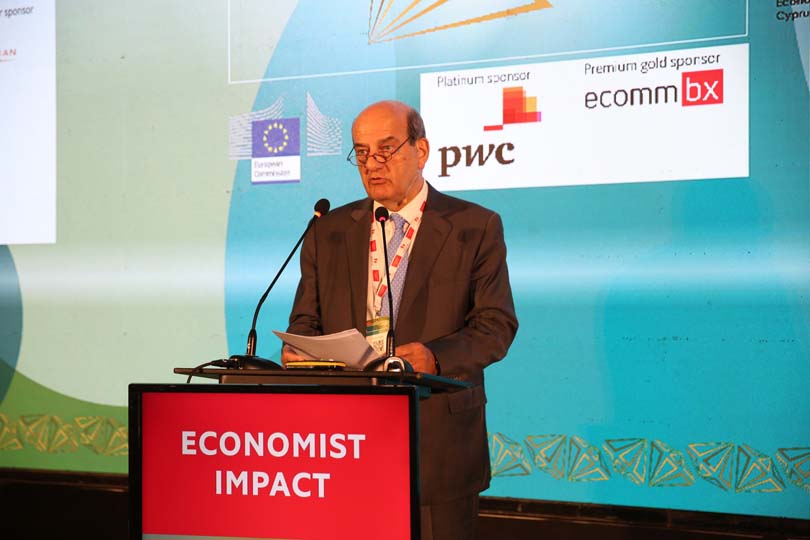
The Cyprus economy needs seven important pillars to respond to the increasingly volatile environment, achieve greater growth, gain a more resilient and competitive economy, and develop innovation and more growth potential, according to PwC CEO Philippos Soseilos.
He was speaking at the panel “Creating Regional Partnerships for a Strong Innovation Hub in the Region”, in the context of the 19th Cyprus Economic Summit. He spoke of the need for tax reform, the cultivation of a crisis management culture, the strengthening of digitisation in the economy and the public sector, horizontal reforms in the education system, as well as the need to have a supportive ecosystem for start-ups who want to do business on the island. All this, of course, becomes more difficult because of instability and multiple crises. On the other hand, as he explained, these crises are a trigger for new opportunities, bringing as an example the pandemic crisis which has boosted the speed towards digitalisation and the search for technological solutions for business operation and practical everyday issues.

The biggest risk is that crisis management is short-sighted, while stressing that sustainable prosperity and economic growth need innovation and a transformative mindset. However, according to a recent PwC survey, 40% of global CEOs estimate that their companies will not be financially viable within the next 10 years with their current operating model. These results were recorded before the launch of GPT4 last March, which reached 1 million users in five days and 180 million users in the last seven months.
Economic Resilience
The crisis can also be really useful and a means to accelerate and implement the necessary transformation and innovation. As Mr. Soseilos said, in Cyprus, we have good reasons to be optimistic about the future. “The Cypriot economy has been highly resilient to external shocks and it is clear that the small size of our economy and its extroversion provide flexibility and recovery potential.” He stressed the need to strengthen digitisation in all sectors of the economy, including of course the public sector, and implement a series of structural horizontal reforms, such as a fit-for-the-future education system and a supportive ecosystem for start-ups with access to finance, guidance and infrastructure. In addition, he underlined that regional partnerships are also important for the osmosis of new ideas and knowledge, while also giving the opportunity for talent exchange between academics and start-up companies.
He added that by enhancing Cyprus’ reputation as an international business centre recognised for its high quality and reliability, it can be a critical success factor for a sustainable development of the country’s economic model. He stressed that as long as we maintain a bad reputation for bad practices, then we are inevitably not attractive for sound business and good investments. The bet we have to win is to increase confidence in our capabilities and to work with businesses that embrace the vision and can contribute to the implementation of Vision 2035. Mr. Soseilos said that we can be very optimistic about the future of Cyprus because there is an ability to solve problems despite the continuous and growing challenges that arise for the economy.
Becoming a Model State
Cyprus encourages international information and communication technology companies to establish themselves in the country with various incentives, said Takis Clerides, President of the Council for Economy and Competitiveness.
The strategy is an initiative of the Council for Economy and Competitiveness, whose president, Takis Clerides, said that its aim is to develop Cyprus into a model state with an effective government, an impartial and strong judicial system, and a transparent market accessible to all. He stressed the need to accelerate digitisation to increase productivity, support the primary and secondary sectors of the economy, and accelerate the transition to a greener economy.

Key drivers of productivity and job creation are digital transformation and technological developments, as well as social sustainability, innovation, and effective governance. Mr. Clerides also said that Cyprus encourages international IT and communication companies to establish themselves in the country with various incentives, including tax advantages and an improved One-Stop Shop process to speed up the establishment of companies in Cyprus. The aim is to make relocation to Cyprus more attractive for international technology and research companies and to promote an environment conducive to innovation and growth.
Highway of the Future
The creation of state-of-the-art data centres and undersea cable networks in the region can be particularly beneficial for Cyprus and Greece, with significant economic benefits for both countries, Dimosthenis Anagnostopoulos said.
On his part, the secretary general for Public Administration Information Systems of the Greek Ministry of Digital Governance, Demosthenes Anagnostopoulos, referred to Greece’s plan to promote regional partnerships and technology. Speaking at the conference, Anagnostopoulos stressed the importance of strong data infrastructure, digital mobility, artificial intelligence monitoring, and business innovation hubs to promote economic growth and cooperation in the region. The creation of state-of-the-art data centres and undersea cable networks in the region can be particularly beneficial for Cyprus and Greece, with significant economic benefits for both countries. He also stressed the importance of cooperation between Greece and Cyprus in this direction, describing it as the “highway of the future”.
He also referred to the field of artificial intelligence, noting the exponential growth of AI models, and warned of the potential risks posed by increasingly intelligent AI models. He said there was a need for careful handling of personal data.
[This article was translated from its Greek original]































